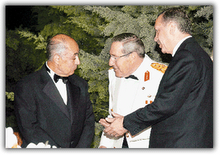Soli Özel'in Financial Times'daki makalesi: "Türkiye modernleşme yoluna devam ediyor"
26 Temmuz 2007
Financial Times
Turkey’s quest to modernise remains on track
Soli Ozel
Rare are the moments in a democratic country’s history when a sitting government increases its level of support substantially, as Turkey’s ruling Justice and Development party (AKP) did last Sunday. These elections consolidate a spectacular realignment that has brought disparate social forces together to challenge the existing distribution of power and privilege.
One must look at the social forces the party represents. The AKP originated from Turkey’s Islamist movement, which was defined by anti-westernism, anti-secularism, xenophobia and an anti-market economic programme. Younger dissenters created the party in a generational and ideological break from the founding fathers after the military’s ousting of Islamists from power in 1997.
Responding to changing demographics and economic geography as well as the public’s democratic aspirations, the party positioned itself as pro-market and pro-European. In 2002 it ran on a platform of democratisation, integration with the world economy and openness, and won. An extraordinarily efficient political machine, with its hand on the pulse of its constituents and sensitive to the needs of the general public, the AKP became a formidable force. It received much support from the rising provincial entrepreneurial classes that are globally integrated but are socially and culturally more conservative than existing elites.
At the same time it gained the backing of poorer segments of the population in metropolitan centres, through diligent social and organisational work and municipal services. Policies such as more accessible healthcare, free distribution of schoolbooks, increased grants for students and housing credits for the lower middle classes and the poor explain its appeal to the less well off. The AKP’s unfettered market orientation endeared it to the existing financial and economic elites as well, although the latter were concerned about the incompatibility of the AKP’s conservatism with their own lifestyles.
In addition, the AKP’s promise of a more liberal and democratic political order appealed to segments of Turkey’s secular population that were increasingly disenchanted with the authoritarianism of the ruling elites. Their support for the AKP, despite their disillusionment with the party’s recent performance on political reform, proved critical, especially in the period after the military’s recent intervention in the choice of the president. Last, the AKP managed to appeal to the Kurdish population of Turkey’s troubled south-east through religion and careful political manoeuvring. Thus there was a mosaic of candidate profiles, from old leftists to members of the Alevi community, from Kurds to thoroughly modern and unveiled women, as the party claimed the centre of Turkish politics.
As a result the AKP received almost even support from across the country. It was the only party whose support was not confined to a specific region or class. Notably, its victory over Kurdish nationalists in many predominantly Kurdish provinces provided it with a mandate to launch a new democratic opening to deal with the Kurdish problem while fighting separatist terrorism.
The result of Sunday’s critical vote was the victory of hope over fear, civilian government over military tutelage and economic and political openness over introversion. It was a vote of confidence in the AKP’s economic performance, which has given Turkey an average growth rate of 7.5 per cent over the past five years. It was also the electorate’s response to the military intervention by “e-memorandum” on April 27. In that sense the Turkish electorate remained true to its tradition of resisting the dictates of the military rulers for the post-coup management of the country. Therefore, these elections strongly highlighted the democratic maturity of the Turkish public.
What these elections do not mean is worth emphasising. The choice was not between an Islamist Turkey and a secular modern one. Turkey has not, by these results, gone back to “the road not taken” at the beginning of the republic and given up on its quest for modernisation. Turkey’s modernisation track is just of a different type, one that is embedded in cultural conservatism and in search of an appropriate synthesis between Islam, capitalism and secular, liberal democracy. This is why the experiment in democratic transformation is significant beyond its borders. How well the AKP manages this transformation as well as how the world, especially Europe and the US, responds to it will, therefore, have global implications.
The writer is a political scientist at Istanbul Bilgi University


